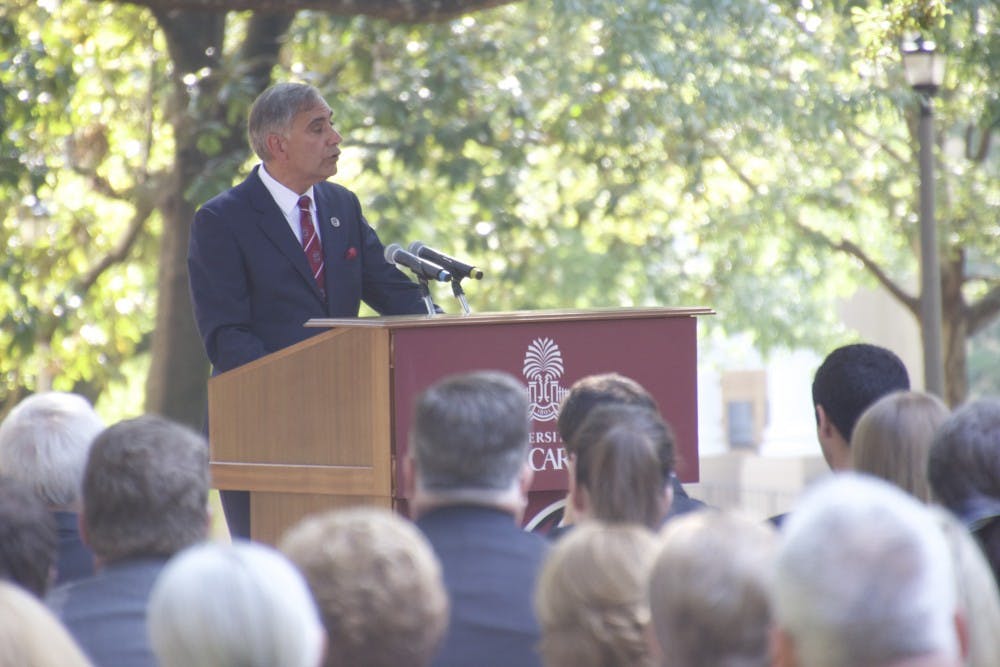In his annual State of the University address on the Horseshoe Thursday morning, President Pastides turned heads when he revealed the final total for the Carolina’s Promise campaign: over $1.043 billion.
This figure sharply overshot the program's original goal of a billion fundraising dollars when it was launched in 2008. It's aim was to tide the university through tough economic times. Pastides said he was ecstatic over the news.
“I remember eyebrows being raised when we contemplated and then announced the goal,” Pastides said. “But I also knew that we had a great case to make, that we could pull together a great campaign committee, that non-alumni would contribute and that everyone wants to be on a winning team.”
Of that $1.043 billion figure, alumni contributed the most at $345,465,510, followed closely by private companies with a total of $309,035,828. Parents, faculty and staff, educational foundations and even students contributed to the rest of it. That money has helped fund scholarships, campus beautification, lab equipment, faculty hiring and library resources.
“I was amazed by the number raised for Carolina’s Promise,” first-year civil engineering student Lane-Marie Kosmata said. “That went above and beyond my expectations.”
Pastides also noted that Carolina’s Promise is a component of broader improvement in the Carolina community. “This isn’t the end of a campaign; it's the beginning of a better future,” he said.
That future, according to Pastides, is couched in a university-wide initiative known as Carolina 2025.
Though few details were actually announced in the speech, Pastides described Carolina 2025 as a “plan that will take the university into the century’s third decade,” while also noting that “the major components focus on the quality of the student experience.”
One aspect of the plan that was announced during the event was a goal of hiring “25 net new faculty members a year through the next decade, in addition to replacing faculty who resign or retire.”
Pastides also addressed problems with student advising: “Last December, after studying national best practices for advising, we sent out a pair of student and adviser surveys," Pastides said. "We soon discovered that our students identified advising as their top priority for institutional improvement. We went straight to work.”
“This past July, under the direction of Dr. Claire Robinson, we opened a new University Advising Center located on the first floor of the Close-Hipp building,” Pastides said. He added that the university plans to hire up to 25 new advisers this year.
Pastides also highlighted the successes of other programs introduced in recent years, including Palmetto College and Graduation with Leadership Distinction. He noted that, to date, 1,452 students have taken classes via Palmetto College, 314 students have graduated with leadership distinction and that the On Your Time Graduation program has allowed the university to design a 12-month academic calendar in order to achieve greater flexibility in scheduling for students.
The success of lobbying efforts led by the university in the South Carolina General Assembly to allow students to use state lottery funds for summer school was also noted in the address. Furthermore, Pastides acknowledged the continuing need for a presence in state and local government in order to ensure that the university’s needs are met, especially with regard to finances. “I will, of course, continue to advocate for increased state funding,” Pastides said.
Pastides took time to acknowledge the shooting that left nine parishioners dead at the Mother Emanuel Church in Charleston this summer, and he advocated for further dialogue on campus with regard to diversity. “A university is a perfect place for honest conversation and debate, conversation that may not always end with concrete resolution but one that advances a respectful tenor and creates a more tightly woven community, one that is resilient in time of crisis and more embracing of change when it arrives,” Pastides said.
In regard to athletics, Pastides noted that his role as NCAA Chairman has made him more capable of influencing the national conversation surrounding collegiate athletics, and he noted that the Gamecock Student-Athlete Promise program has become a national model.
“I believe strongly that it’s important to preserve the amateur model we love so much, while providing more financial support, career counseling, health monitoring and financial well-being to our student-athletes,” Pastides said. “Gamecock students this fall received an extra stipend to cover legitimate expenses not formerly allowed by the NCAA.”
Some of those in attendance, like first-year cardiovascular technology student Sarah Hill, found the positivity of the speech to be one of its best qualities.
“[Pastides’] optimism and passion is above and beyond,” Hill said. “I love hearing what he has to say about our school.”
Pastides was introduced at the event by Undergraduate Student Body President Jonathan Kaufman and Graduate Student Body President Andrew Fogner. The marching band played a set before the event began, and student music group Mayberry ended the event with a rendition of the alma mater.

